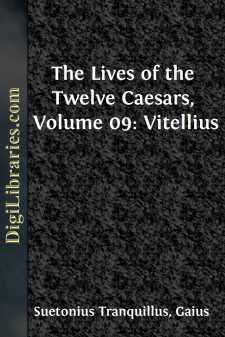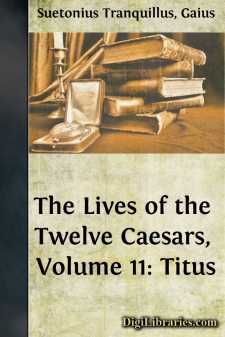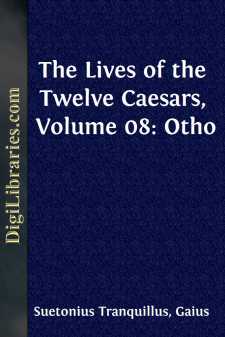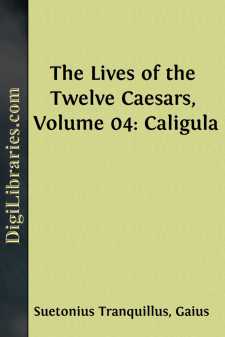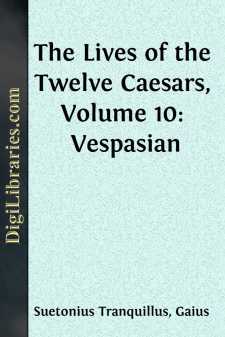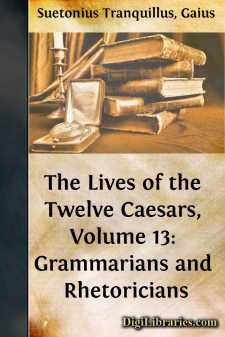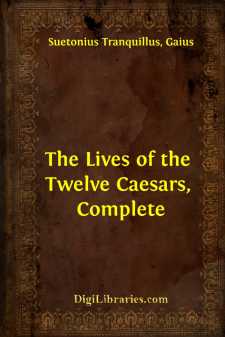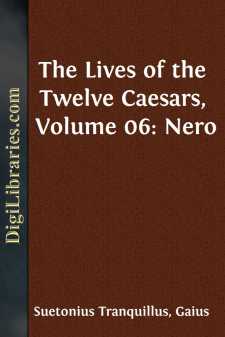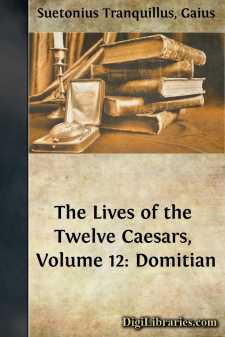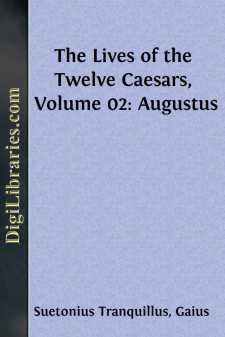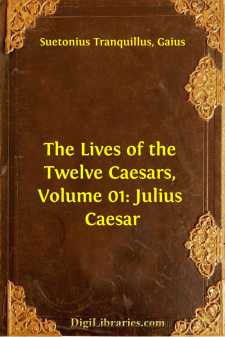Categories
- Antiques & Collectibles 13
- Architecture 36
- Art 48
- Bibles 22
- Biography & Autobiography 813
- Body, Mind & Spirit 142
- Business & Economics 28
- Children's Books 17
- Children's Fiction 14
- Computers 4
- Cooking 94
- Crafts & Hobbies 4
- Drama 346
- Education 46
- Family & Relationships 57
- Fiction 11829
- Games 19
- Gardening 17
- Health & Fitness 34
- History 1377
- House & Home 1
- Humor 147
- Juvenile Fiction 1873
- Juvenile Nonfiction 202
- Language Arts & Disciplines 88
- Law 16
- Literary Collections 686
- Literary Criticism 179
- Mathematics 13
- Medical 41
- Music 40
- Nature 179
- Non-Classifiable 1768
- Performing Arts 7
- Periodicals 1453
- Philosophy 64
- Photography 2
- Poetry 896
- Political Science 203
- Psychology 42
- Reference 154
- Religion 513
- Science 126
- Self-Help 84
- Social Science 81
- Sports & Recreation 34
- Study Aids 3
- Technology & Engineering 59
- Transportation 23
- Travel 463
- True Crime 29
The Lives of the Twelve Caesars, Volume 09: Vitellius
Description:
Excerpt
AULUS VITELLIUS. (427)
I. Very different accounts are given of the origin of the Vitellian family. Some describe it as ancient and noble, others as recent and obscure, nay, extremely mean. I am inclined to think, that these several representations have been made by the flatterers and detractors of Vitellius, after he became emperor, unless the fortunes of the family varied before. There is extant a memoir addressed by Quintus Eulogius to Quintus Vitellius, quaestor to the Divine Augustus, in which it is said, that the Vitellii were descended from Faunus, king of the aborigines, and Vitellia [689], who was worshipped in many places as a goddess, and that they reigned formerly over the whole of Latium: that all who were left of the family removed out of the country of the Sabines to Rome, and were enrolled among the patricians: that some monuments of the family continued a long time; as the Vitellian Way, reaching from the Janiculum to the sea, and likewise a colony of that name, which, at a very remote period of time, they desired leave from the government to defend against the Aequicolae [690], with a force raised by their own family only: also that, in the time of the war with the Samnites, some of the Vitellii who went with the troops levied for the security of Apulia, settled at Nuceria [691], and their descendants, a long time afterwards, returned again to Rome, and were admitted (428) into the patrician order. On the other hand, the generality of writers say that the founder of the family was a freedman. Cassius Severus [692] and some others relate that he was likewise a cobbler, whose son having made a considerable fortune by agencies and dealings in confiscated property, begot, by a common strumpet, daughter of one Antiochus, a baker, a child, who afterwards became a Roman knight. Of these different accounts the reader is left to take his choice.
II. It is certain, however, that Publius Vitellius, of Nuceria, whether of an ancient family, or of low extraction, was a Roman knight, and a procurator to Augustus. He left behind him four sons, all men of very high station, who had the same cognomen, but the different praenomina of Aulus, Quintus, Publius, and Lucius. Aulus died in the enjoyment of the consulship [693], which office he bore jointly with Domitius, the father of Nero Caesar. He was elegant to excess in his manner of living, and notorious for the vast expense of his entertainments. Quintus was deprived of his rank of senator, when, upon a motion made by Tiberius, a resolution passed to purge the senate of those who were in any respect not duly qualified for that honour. Publius, an intimate friend and companion of Germanicus, prosecuted his enemy and murderer, Cneius Piso, and procured sentence against him. After he had been made proctor, being arrested among the accomplices of Sejanus, and delivered into the hands of his brother to be confined in his house, he opened a vein with a penknife, intending to bleed himself to death. He suffered, however, the wound to be bound up and cured, not so much from repenting the resolution he had formed, as to comply with the importunity of his relations....


